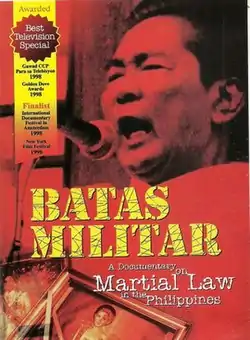Batas Militar (1997 film)
Batas Militar (transl. Martial Law, marketed as Batas Militar: A Documentary on Martial Law in the Philippines) is a 1997 Filipino television documentary film about martial law under Ferdinand Marcos.[3] The film was directed by Jon Red and Jeannette Ifurung, with the former focusing on dramatizations.[4] It is the most expensive documentary film produced in the Philippines.
| Batas Militar | |
|---|---|
 | |
| Genre | Documentary |
| Written by | Lito Tiongson [1] |
| Directed by | |
| Narrated by | Joonee Gamboa[1] |
| Composer | Jaime Fabregas[1] |
| Country of origin | Philippines |
| Original language | Filipino |
| Production | |
| Executive producer | Kara Magsanoc-Alikpala[1] |
| Producers |
|
| Running time | 110 minutes[1] |
| Production company | Foundation for Worldwide People Power[1] |
| Release | |
| Original network | ABS-CBN |
| Picture format | 480i (SDTV) |
| Original release |
|
The documentary was broadcast on September 21, 1997. The documentary was subsequently released on VHS.
Synopsis
It features the human rights violations during martial law in the Philippines, the economy, and the biographies of Ferdinand Marcos, his wife Imelda Marcos, and his prominent critic Benigno Aquino Jr.
Interviewees
The following is a list of interviewees in the documentary, conducted from March until May 1997:[5]
- Satur Ocampo (National Democratic Front [NDF] founder, Bayan Muna representative)
- Jovito Salonga (senator)
- Bernabe Buscayno (New People's Army [NPA] founder)
- Aquilino Pimentel Jr. (Con-Con delegate, 1978 Lakas ng Bayan candidate)
- Raul Manglapus (1965 presidential candidate, Con-Con delegate, Movement for a Free Philippines chair)
- Romeo Espino (chief-of-staff of the Armed Forces of the Philippines [AFP] from 1972 to 1981)
- Manuel Yan (chief-of-staff of the Armed Forces of the Philippines [AFP] from 1968 to 1972)
- Rafael Ileto (vice chief-of-staff of the AFP)
- Bonifacio Gillego (World War II veteran, congressman)
- Blas Ople (Secretary/Minister of Labor from 1967 to 1986, senator)
- Onofre Corpuz (Secretary of Education from 1968 to 1971)
- Imelda Marcos (First Lady of the Philippines from 1965 to 1986)
- Corazon Aquino (President of the Philippines from 1986 to 1992, wife of Benigno Aquino Jr.)
- Haydee Yorac (Chairman of the Presidential Commission on Good Government, COMELEC chairperson)
- Fidel Ramos (President of the Philippines from 1992 to 1998, chair of the Philippine Constabulary [PC] during the Marcos regime)
- Carolina Hernandez (human rights political scientist)
- Joker Arroyo (human rights lawyer during the Marcos regime, congressman and senator)
- Nina Fajardo (victim of the human rights violation during Martial Law)
- Rafael Zagala (chief of the Philippine Army during the Marcos regime)
- Priscilla Mijares (judge, widow of Primitivo Mijares)
- Letty Jimenez Magsanoc (journalist)
- Carmen Pedrosa (author)
- Behn Cervantes (film director)
- Francisco Nemenzo Jr. (political scientist)
- Eugenio Lopez Jr. (businessman, chief executive officer of ABS-CBN from 1956 to 1993)
- Vicente Paterno (technocrat during the Marcos regime, Secretary/Minister of Industry from 1974 to 1979)
- Solita Monsod (economist)
- Ceres Doyo (journalist)
- Doris Baffrey (April 6 Movement founder)
- Teodoro Benigno (journalist of Agence France-Presse in the Philippines)
- Jose Almonte (Reform the Armed Forces Movement founder)
- Butz Aquino (August Twenty-One Movement founder, congressman)
- Jaime Sin (Archbishop of Manila)
- June Keithley (radio and television reporter)
Production
Eugenia Apostol, a journalist and publisher, brought a film crew together to create a documentary under her newly established Foundation for Worldwide People Power (renamed as the Eggie Apostol Foundation in 2012) about the injustices committed during the two-decade presidency of Ferdinand Marcos.[2][6] Jon Red and Jeannette Ifurung became the film's pair of directors, with the former focusing on dramatizations and shoots on location, while the latter focused on post-production.[1] The resulting work became the most expensive documentary film produced in the Philippines.[2]
Release
Batas Militar aired on Philippine television network ABS-CBN on September 21, 1997 and was repeated on February 25, 2016,[2] airing on PTV in 1998 and 2012, ABS-CBN News Channel in 2012 and 2016, and Knowledge Channel from 2011 until 2012. Afterwards, it was subsequently released on VHS.[2][7] As of 2016, the documentary has not yet been released on the DVD format.[2] However, filmmaker Mike de Leon has since posted the entire film on Vimeo with English subtitles through his Citizen Jake production account on February 1, 2019.[1]
See also
- List of films about martial law in the Philippines
References
- Foundation for Worldwide People Power (February 1, 2019). Batas Militar. Vimeo, LLC. Retrieved April 29, 2020.
- Doyo, Ma. Ceres P. (March 3, 2016). "Clamor for 'Batas Militar' DVD". Philippine Daily Inquirer. Philippine Daily Inquirer, Inc. Retrieved November 12, 2017.
- "Who's Who in Print Journalism: Eugenia Apostol". Media Museum. Asian Institute of Journalism and Communication. Retrieved April 29, 2020.
[Eugenia Apostol] produced and released the television documentary "Batas Militar" in time for the anniversary of the declaration of martial law in 1997.
- Citizen Jake (February 1, 2019). "Batas Militar 1997. Color/109 minutes; with English Subtitles. A Production of the Eggie Apostol Foundation". Vimeo. Vimeo, LLC. Retrieved April 29, 2020.
- Proclamation No. 1081 - Reflections on Batas Militar (Martial Law) on YouTube
- Hernandez, Butch (August 3, 2012). "The Eggie Apostol Foundation". Inquirer Opinion. INQUIRER.net. Retrieved April 29, 2020.
- "Batas militar (VHS tape, 1997)". WorldCat. Retrieved April 29, 2020.